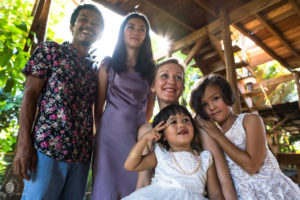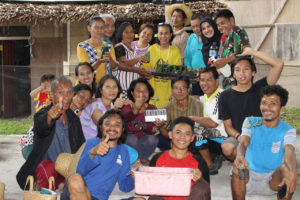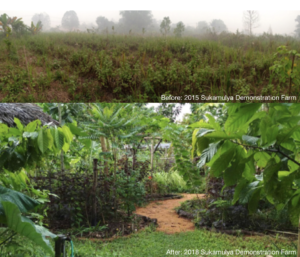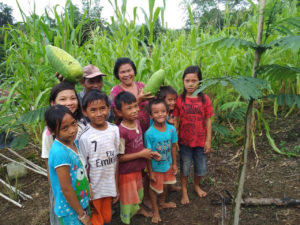
From left: Jayadi, daughter Murianti, Frederika, daughters Audra, and Emalia
Reader Catherine Wite introduces us to the pathfinding work of her daughter and son-in-law in the jungles of Kalimantan, Borneo, Indonesia. (1)
They’re not waiting for the Reval!
Helping to Rescue the Second Lungs of the Planet in Kalimantan
by Catherine Wite, 12 Aug. 2019
In 2014 an Australian woman Frederika, her Indonesian husband Jayadi, and two daughters left their Australian home in Melbourne for Central Kalimantan, Borneo, Indonesia, to fulfil their dream to work on sustainable solutions to the challenging environmental and social issues facing the region.
The natural integrity and rural livelihoods of Kalimantan are threatened by illegal logging, mining, and the expansion of industrial-scale monoculture, such as palm oil plantations. Every year large-scale fires cover the area in a toxic smog that reaches as far as Singapore, Malaysia, Thailand and the Philippines.

Dayak farmers studying intensive permaculture design
Their deep desire was to share their knowledge about sustainable solutions in permaculture techniques, regenerating the land and most importantly preventing further destruction of this magnificent natural environment with jungles still home to the largest remaining wild population of Orangutans , which have been declared as “critically endangered” since 2016.
Prior to this Jayadi studied for the Permaculture Diploma in Australia, and volunteered as a Permaculture Consultant for two years in remote India. Frederika, a Social Worker, also trained in Permaculture to work as a team beside her husband.
They’ve established in a short three-year period a non-profit project Permakulture Kalimantan Foundation, (PKF) first and foremost working on a desolate, depleted 4400 square metres of land which has become the the infrastructure for a Demonstration Learning Farm with a vision of supporting communities to return to sustainable living.

Before and after 3 years
This system and their way of working values and integrates the natural environment, people and culture for the long term, with the values underpinning their work being Care of Earth, Care of People, Care for the Future.
Since they began working it, this site has become an ecologically-diverse, multilayered, canopy food forest with shrubs, herbs, edible crops, and trees. There are many variations of compost production, animal husbandry with chickens, ducks, a cow and the establishment of a training room for the Dayak farmers and the volunteers worldwide who come and stay for months at a time to learn and support this important growing venture.
This industrious young couple have also included in their project sustainable coconut oil and soap production and they hope to expand this in order to provide sustainable employment options for more local people.
They’ve plans to establish a café on the premises which will attract tourists and visitors alike where they can sell locally grown food, sourced on site as well as from their community network of farmers who grow sustainable produce. “Jungle Soap,” their coconut-oil-based, hand-crafted soap is produced with a ”no-waste process” and is lined with banana leaves.
Ninety-five percent of the ingredients are harvested from the permaculture farm. It has a unique niche market with both the locals and tourists loving it. This social enterprise, as well as being a source of revenue for their non-profit Foundation, will also provide employment for the locals.
In 2015 Central Kalimantan experienced an unprecedented environmental and public health emergency that has been labelled “the worst environmental crime of the 21st century.”
In October the emissions from fires exceeded the emissions from the entire US economy – that is almost 16 million tons of CO2 emissions per day. This was the result of unsustainable agricultural and land management practices, with studies showing that over 100,000 people were killed across the region, and that it caused damage in the region of USD 20 billion.

Program graduate and family reaping the benefits
Frederika, pregnant with her third child and along with their other two daughters were smoke refugees returning home to Melbourne, where she had her third daughter a few months later. After the birth in March 2016 they returned to Kalimantan to resume their work.
PKF trained 24 leading indigenous farmers in 2017 in an intensive permaculture design course, which was followed by nine months of mentoring in their villages. The amazing part was they found that the permaculture approach validated indigenous traditional sustainable farming practices.
This validation boosted the confidence of these communities and resulted in hundreds of villagers across six villages being trained by their peers in these new sustainable permaculture approaches. These approaches combined with their old ways that have always protected the forest and ecosystems.
This work was a partnership with Borneo Institute as part of the intercropping component of the award winning “One Million Tree Project.”
Remote communities now grow enough food to meet their needs with the revival of indigenous seeds and crops, also establishing seed banks which enable them to barter, sell and trade these seeds among their communities. They now understand the negative impact of using chemicals and they reject the use of GMO seeds, pesticides and chemical fertilisers.
PKF has also been instrumental in establishing the BCU School Kitchen Garden, the first integrated permaculture school garden in Kalimantan. The project aims to be an outdoor classroom for school students.
It links school curriculum with real-life learning about sustainable land management, conservation and organic food production. It also provides educational and training and skill development in these areas for the broader local community in Central Kalimantan.
During the school vacation the couple runs a school-holiday program focused on permaculture and conservation education through fun activities with the local school children within the school garden.
Jayadi and Frederika Paembonan, who founded PKF, are an absolutely-inspirational example of how to follow one’s dream, trust in God, surrender one’s doubts and put into practice their heart’s desire to support the planet and her people at this crucial time.
This wonderful woman is my daughter and I am so proud of her and Jayadi. May God continue to bless them abundantly.
Their website is www.permakulturkalimantan.org
www.facebook.com/permakulturkalimantanfoundation
Instagram: permakulturkalimantan
Click here to donate in support of Permakulturkalimantan.
Footnotes
(1) On Aug. 17, 2019, Catherine wrote:
Dear Steve,
My daughter Frederika birthed a healthy 4 kg daughter at home, with a midwife, yesterday the 17th August at 4.39. Baby has been named Sofati, meaning “Successful” (Grandma here is calling her Sofi). I followed the birth on my phone, calling in Mother Mary, the Grandmothers, etc. We were all very relieved and thankful when she arrived safely, and mother was healthy as well.
[Nice things deleted.]
With love and gratitude
Catherine.

